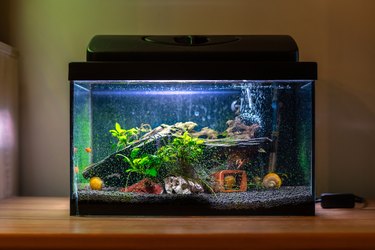
If your aquarium is suddenly teeming with small white flatworms inching across the glass, they may be planaria, which will eat fish eggs, feast on weak or sick fish, and kill shrimp if you have them. Fortunately, goldfish, mollies, bettas, angelfish, and other fish that eat live food are likely planaria-eating too, and they may be able to rid your fish tank of these pests.
Planaria are freshwater flatworms
Video of the Day
Planaria are flatworms that have pointed tails, leaf-shaped bodies, and spade-shaped heads. They are usually white or tan in color, and although they can grow to be over a foot long, they're likely very small when you discover them crawling across the glass in your aquarium — from 1/10- to 6/10-inch long. Although they thrive in freshwater, planaria can also be found in saltwater tanks.
Video of the Day
The planaria classification is usually Turbellaria, although many flatworms are lumped together as planaria. The best way to distinguish true planaria is by checking for their spade-shaped heads. If the worms are very tiny, they may have to be investigated under a microscope.
On top of the head are two eyes that are sometimes crossed, explaining why planaria are also called "cross-eyed worms." The other distinguishing feature is that the worms' body is flat. If the worms in your aquarium are squiggly and round, they are not planaria.
Causes of planaria infestations
These cross-eyed flatworms often tag along on fish you buy or plants or accessories that have been in a fish tank with planaria. Since they are so tiny when starting out, you may not see them tucked into the crevices of rocks or on a fish underbelly. Some planaria are even microscopic.
Two attributes of planaria enable them to multiply rapidly once they are in an aquarium. Planaria are hermaphrodites, possessing the sex organs of both males and females, so they can reproduce on their own. Also, they can regenerate from just a tiny piece of any part of their body.
Planaria are often found in aquariums where fish have been given too much food, as they love feasting on the leftovers.
Planaria-eating freshwater fish
Fancy goldfish are known for eating planaria. Their short digestive tract means they are often hungry, so they will eat planaria if they are in the tank. Mollies like to eat planaria eggs, which is ideal to keep new planaria from inhabiting the aquarium. Bettas are known for eating live food, so they should be delighted to find themselves in an aquarium with planaria for them to consume. Angelfish are known for their beauty, but they will also help by eating the planaria.
If your only mission is to rid your aquarium of planaria, choose only one type of fish and see if they are able to clear the tank of your flatworms. Each fish has its own needs and preferences as to water temperature, pH, and other environmental factors, and you will be continuing to care for them after the planaria are gone. Choose one fish whose preferences are similar to the fish you already have in your aquarium. Be sure the type of fish you choose does well in a community. Fancy goldfish, mollies, bettas, and angelfish all do well in aquariums with multiple types of fish.
To encourage the fish to eat the planaria, cut back on the amount of food you give them so that they are hungry and will go looking for the worms. If you usually feed your fish twice a day, feed them only once so they will make planaria their second meal. You'll want to feed lightly anyway since the presence of lots of planaria indicates that there was leftover food that attracted them.
Medicine to clear out planaria
If adding planaria-eating fish to your aquarium doesn't clear out your flatworms, look into deworming medicines that are known for their fast work. Some aquarists have had success with canine dewormers, but if you go that route, use a small amount and see if it gets rid of the planaria. Once they die, ammonia will form quickly in the tank, so remove the dead worms promptly.